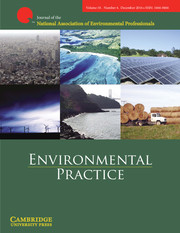Crossref Citations
This article has been cited by the following publications. This list is generated based on data provided by
Crossref.
Naeem, Malik
and
Neal, Mark
2012.
Sustainability in business education in the Asia Pacific region: a snapshot of the situation.
International Journal of Sustainability in Higher Education,
Vol. 13,
Issue. 1,
p.
60.
Sloan, Thomas
Davila, Federico
and
Malbon, Eleanor
2013.
Student-Facilitators as University Tutors: An Effective Approach to Sustainability Education.
Australian Journal of Environmental Education,
Vol. 29,
Issue. 1,
p.
80.
Jabbour, Charbel José Chiappetta
Sarkis, Joseph
Jabbour, Ana Beatriz Lopes de Sousa
and
Govindan, Kannan
2013.
Understanding the process of greening of Brazilian business schools.
Journal of Cleaner Production,
Vol. 61,
Issue. ,
p.
25.
Colón-Rivera, Ricardo J
Marshall, Kellen
Soto-Santiago, Francisco J
Ortiz-Torres, Dorimar
and
Flower, Charles E
2013.
Moving forward: fostering the next generation of Earth stewards in the STEM disciplines.
Frontiers in Ecology and the Environment,
Vol. 11,
Issue. 7,
p.
383.
Marinho, Maerbal
Gonçalves, Maria do Socorro
and
Kiperstok, Asher
2014.
Water conservation as a tool to support sustainable practices in a Brazilian public university.
Journal of Cleaner Production,
Vol. 62,
Issue. ,
p.
98.
Hesselbarth, Charlotte
and
Schaltegger, Stefan
2014.
Educating change agents for sustainability – learnings from the first sustainability management master of business administration.
Journal of Cleaner Production,
Vol. 62,
Issue. ,
p.
24.
Lidstone, Lauri
Wright, Tarah
and
Sherren, Kate
2015.
An analysis of Canadian STARS-rated higher education sustainability policies.
Environment, Development and Sustainability,
Vol. 17,
Issue. 2,
p.
259.
Larrán Jorge, Manuel
Andrades Peña, Francisco Javier
and
Muriel de los Reyes, María José
2015.
Factors Influencing the Presence of Ethics and CSR Stand-alone Courses in the Accounting Masters Curricula: An International Study.
Accounting Education,
Vol. 24,
Issue. 5,
p.
361.
Puntha, Helen
Molthan-Hill, Petra
Dharmasasmita, Aldilla
and
Simmons, Eunice
2015.
Integrating Sustainability Thinking in Science and Engineering Curricula.
p.
31.
Rickards, Sara
Howitt, Richie
and
Suchet-Pearson, Sandie
2015.
Integrative Approaches to Sustainable Development at University Level.
p.
43.
Ferreira, Jo-Anne
Ryan, Lisa
and
Davis, Julie
2015.
Developing Knowledge and Leadership in Pre-Service Teacher Education Systems.
Australian Journal of Environmental Education,
Vol. 31,
Issue. 2,
p.
194.
Lidstone, Lauri
Wright, Tarah
and
Sherren, Kate
2015.
Canadian STARS-Rated Campus Sustainability Plans: Priorities, Plan Creation and Design.
Sustainability,
Vol. 7,
Issue. 1,
p.
725.
Carpenter, Serena
Takahashi, Bruno
Lertpratchya, Alisa P.
and
Cunningham, Carie
2016.
Greening the campus: a theoretical extension of the dialogic communication approach.
International Journal of Sustainability in Higher Education,
Vol. 17,
Issue. 4,
p.
520.
Pipere, Anita
2016.
Envisioning Complexity: Towards a New Conceptualization of Educational Research for Sustainability.
Discourse and Communication for Sustainable Education,
Vol. 7,
Issue. 2,
p.
68.
Setó-Pamies, Dolors
and
Papaoikonomou, Eleni
2016.
A Multi-level Perspective for the Integration of Ethics, Corporate Social Responsibility and Sustainability (ECSRS) in Management Education.
Journal of Business Ethics,
Vol. 136,
Issue. 3,
p.
523.
Vaughter, Philip
McKenzie, Marcia
Lidstone, Lauri
and
Wright, Tarah
2016.
Campus sustainability governance in Canada.
International Journal of Sustainability in Higher Education,
Vol. 17,
Issue. 1,
p.
16.
Larrán Jorge, Manuel
Andrades Peña, Francisco Javier
and
Muriel de los Reyes, Maria Jose
2017.
Analysing the inclusion of stand-alone courses on ethics and CSR.
Sustainability Accounting, Management and Policy Journal,
Vol. 8,
Issue. 2,
p.
114.
Nedelko, Zlatko
Potocan, Vojko
and
Alfirević, Nikša
2017.
Exploring the Influence of Personal Values and Cultures in the Workplace.
p.
119.
Davis, Julie
and
Ferreira, Jo-Anne
2017.
Handbook of Theory and Practice of Sustainable Development in Higher Education.
p.
217.
Saviano, Marialuisa
Barile, Sergio
Spohrer, James Clinton
and
Caputo, Francesco
2017.
A service research contribution to the global challenge of sustainability.
Journal of Service Theory and Practice,
Vol. 27,
Issue. 5,
p.
951.




